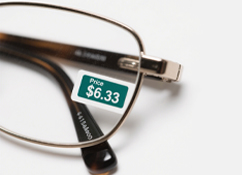For many, glasses are a daily lifeline—until they become the source of persistent, itchy skin irritation. Just ask Robert Thompson, a retired Manhattan executive whose stylish gold - rimmed presbyopic glasses turned his reading routine into a months - long battle with recurring eczema.
Mr. Thompson got his gold - rimmed frames a year ago to correct age - related farsightedness. At first, they were perfect: sleek, functional, and a boost to his daily life. But six months later, he noticed red, itchy patches on the bridge of his nose—eczema that wouldn’t go away.
He visited Queens Hospital Center, where doctors diagnosed eczema and prescribed topical treatments. He avoided his glasses for two weeks until the rash cleared—but the moment he put his gold frames back on, the eczema returned worse than before. A second round of treatment took a month to heal, only for the rash to flare up again shortly after.
Frustrated, Mr. Thompson met Dr. Emily Chen, who zeroed in on his metal frames. “Gold - rimmed frames often contain nickel,” she explained—an alloy that’s harmless to most but a potent allergen for some. She recommended a patch test to detect contact allergens like nickel sulfate.
The results were clear: Mr. Thompson was allergic to nickel sulfate. Repeated contact with the nickel in his gold frames had triggered a delayed allergic reaction—his body had grown sensitized over months of wear, leading to recurring eczema.
Dr. Chen’s solution? Switch to non - metal frames. Mr. Thompson traded his gold rims for lightweight plastic frames, and the change was immediate. Now he wears his glasses daily to read, and his eczema hasn’t returned. “I never thought my glasses—the thing that helped me see—was the problem,” he said. “Switching frames gave me my life back.”
Mr. Thompson’s story is far from unique. Nickel sulfate is one of the top causes of recurring eczema or dermatitis around glasses. Here’s what you need to know:
No one is born allergic to nickel. It takes repeated exposure—weeks, months, or even years—for your body to become sensitized. Once sensitized, even minimal contact (like wearing metal frames daily) can trigger a rash. Mr. Thompson’s months of wearing gold frames slowly trained his immune system to react—turning a “harmless” accessory into an irritant.
If your eczema or dermatitis is only on the bridge of your nose, behind your ears, or other areas where your glasses touch skin—your frames are likely the cause. These localized symptoms are a red flag for contact dermatitis, not a random flare - up.
The solution isn’t in more potent creams—it’s in swapping your frames. Ditch metal options for non - metal materials like:
- Plastic: Lightweight and affordable
- Acetate: Durable and hypoallergenic
- Titanium: Nickel - free and strong

Mr. Thompson’s switch to plastic frames ended his eczema overnight—and it can work for you too.
If you’re dealing with persistent, recurring eczema from your glasses, don’t just soothe the symptoms—address the root cause. Here’s what to do:
- Check your frame labels: Look for “nickel - free” or “hypoallergenic” claims.
- Get a patch test: A dermatologist can confirm nickel allergy with a simple test.
- Switch to non - metal frames: Your skin’s health is worth trading metal frames for comfort.

For Mr. Thompson, the answer wasn’t in stronger creams—it was in a new pair of frames. Glasses should help you see the world clearer—not make your skin suffer. If your frames are causing irritation, take action today. Your nose (and your routine) will thank you.











